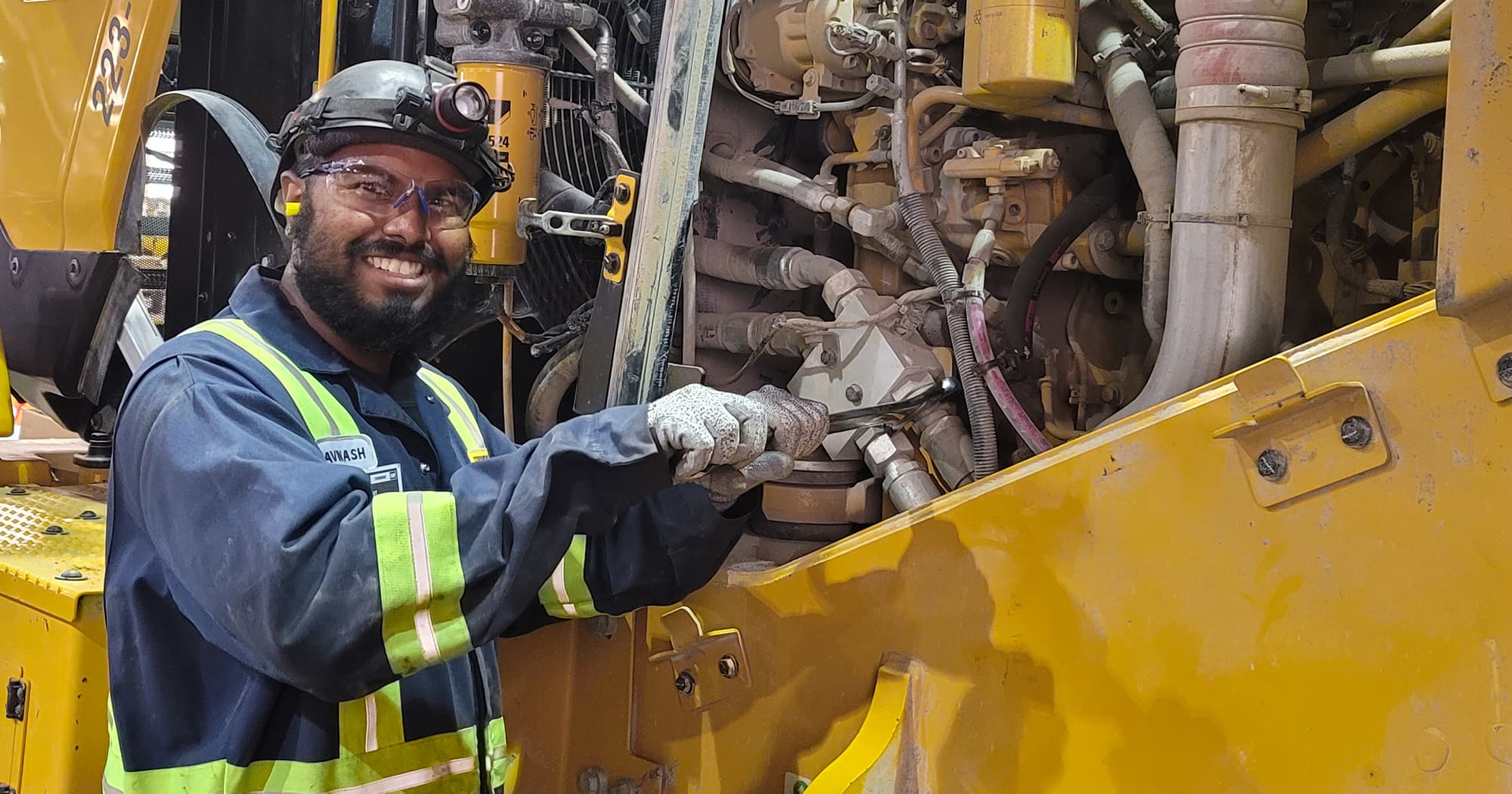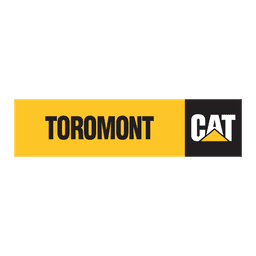This article is republished with the permission of Toromont CAT. The original article can be found here.
He is at the heart of operations, ensuring equipment performs when needed. He is the pillar of our service department. He is an Avinash Narine-Jaikaran, Toromont Cat heavy equipment technician, and things wouldn’t run smoothly without him.
How long have you been a heavy equipment technician?
I’ve been a technician for about three years. My Toromont apprenticeship program is almost over, and I’m about to take my license exam (Red Seal). I was supposed to graduate in April, but things got delayed because of COVID. Before that, I completed a 2-year mechanics program (Heavy Duty Equipment) at Centennial College.
How would you describe the apprenticeship program at Toromont Cat?
Apprentices have access to a lot of support, such as on-the-job training designed explicitly for apprentices. The program also offers a lot of variety for apprentices and allows, allowing each out to different techs and access to several references. Another significant aspect of the program, which few people know about, is that the training takes place in the shop, the classroom and online. An added benefit for apprentices is the ability to continue to follow training sessions after being licensed. They (Toromont) don’t forget about you once you’re licensed; they can support and expand your development.
Do you think your current job will differ once you’re licensed?
The job won’t be that much different once I’m licensed; I think there’ll jusless variety. Once you are licensed, you’re on your own – no one will be standing by your side, watching you. You will be asked to perform certain tasks classified under a specific type or amount of experience. For instance, one task may be assigned to a licensed technician who has the skills to complete the job, while another task may be assigned to a level 1 apprentice or level 2 apprentice if they have performed that task before while being supervised. As an apprentice technician, you must build your experience, and you’ll eventually perform licensed work monitored or validated by a licensed tech. After that, the choice is yours: if you choose to go further, you can take steps to obtain your license, which is what I decided to do. When you reach the end of the apprenticeship, you understand the work and how to do it.
What made you choose to become a heavy equipment mechanic?
The technician gene runs in my family. My dad is a heavy equipment tech. As for me, I was very passionate about the automotive industry. I loved to work on cars, but I wasn’t sure I wanted to do that all day and then come home to fix my car. I wavered a lot when it came to a career choice. I even ventured into aviation but found it a bit intimidating. I eventually started visiting my dad at work and fell in love with the job and equipment. I admire the complexity of the tasks and how well technicians can complete them. In my opinion, heavy equipment is the one trade that brings everything together: heavy equipment has hydraulics, which is similar to plumbing equipment, and it also has electrical components, just like in the equipment an electrician works on. And then there’s the mechanical aspect, which is much more than a simple automobile. To me, heavy equipment has it all.

In your opinion, what does becoming a heavy equipment tech take?
To get into this trade, you need an open-minded mindset. You also have to think about safety, which is critical. Many of our tasks are intimidating, but there’s always a safer way. This career might be perfect if you love working with your hands and care about safety. You should enjoy fixing and figuring things out and being curious about their work.
What is a typical day for you?
Honestly, every day is different. That is what is fantastic about this trade. It’s very versatile and filled with many different options to choose from. It can be pleasantly unpredictable. One day, you may remove an engine; the next, you diagnose hydraulics on a machine. The days are usually planned by the supervisors and lead hands, and they will assign work according to your skill set and in line with your development needs. For example, if you’ve worked on a couple of engines before, you’ll be asked to work on axles since that will allow you to develop your skills. So unless you’re working on a big project projected to last a long time, each day will involve different tasks. Sometimes, you may work on one machine for an entire month (in the case of an overhaul job, for instance). There’s something great about working on a task like that because you know exactly what the day entails and what is required of you. You can just keep working away. But whatever the tasks are, the days are planned very well, which is nice.
So, do you come in the morning and have your supervisor hand you a list of tasks that need to be done that day?
Yes. We meet every morning to discuss safety (we call these our Safety Talk meetings) and share our opinions and experiences. We then have a morning stretching session. After that, we complete a pre-job safety card, which entails any risks or hazards we may encounter while on the job, reminding us to be mindful during our tasks. We then review the list with our lead hands and obtain any information about our tasks. This is our chance to get details regarding our work for the day.
In your case, do you perform most of your work in the shop?
Yes. Near the end of your apprenticeship, you may be asked to work on a customer site, but those tasks are usually reserved for more experienced techs. Initially, it can be a little intimidating because it’s a brand-new environment, and there are more things to consider. But you eventually become used to it, and some techs discover how much they like it, which allows them to transition to a field service job.
What would you say is the main or most common challenge you are faced with at work?
Sometimes, the main challenge is dealing with the machine itself. Not everything we work on is new and clean. The equipment we receive is often packed with dirt, salt, or filth (i.e., a garbage removal machine). When a job doesn’t go as smoothly as planned, it can be frustrating because it feels as though you’re taking one step forward and two steps back. I can get frustrated when working on parts isn’t as simple as I’d imagined. But other than that, the work is pretty straightforward.
Are new technologies making your work easier?
Yes, they make it easier for technicians to perform diagnostics. Most older machines don't have a lot of electronics and sensors, but the newer machines are loaded with them. Almost every part of the machine has a sensor or electronic. So troubleshooting is much more on newer machines than on older ones. Sometimes, it’s a win-lose situation because you can quickly diagnose a machine but have trouble repairing it. For example, older machines used to have 3 ECM (Electronic Control Module), but newer ones can have 17 ECM[HL1], making things more complicated.

Do you have an anecdote or a story to share?
It’s not a story per se, but something that sticks with me. When we have our morning discussion, we sometimes hear about events in other branches, on customer sites, or with colleagues. These stories usually involve challenges techs faced or accidents that happened, but they always make me think about how I should handle those particular tasks. I remember the story of a tech who didn’t lift the machine correctly or didn’t perform a task correctly, and that clicked for me. Sometimes, we hear horror stories of people who got severely injured. We work with big machines, heavy loads, and moving parts, representing a few risks. I haven't dealt with significant problems or accidents, and I'm happy about that. But I register everything I hear!
Embedded content: https://youtu.be/cypBf_BH0-U
How would you qualify the safety standard at Toromont?
I think Toromont places a heavy emphasis on safety, especially when a new tech joins the team. They are always surprised by the measures we must take (what we must wear, the processes we must follow, etc.). We must develop specific practices and adopt new habits; these safety measures soon become second nature. Toromont is exceptionally diligent regarding safety, and we are all encouraged to step back to see how we can improve safety even more the next time. Safety is an important aspect here, and we talk about it a lot, whether it’s through sharing our experiences, analyzing incidents, or getting corporate training. It’s a constant.
What do you like the most about your work?
I love the environment, and I love the people I work with. Enjoying the people and the atmosphere is an essential factor for me. I have no hesitation in asking someone a question or asking them for help. The people I work with that make my day go by a lot faster, which is essential to me.
In your tasks, what do you prefer doing?
I love working on engines. That's my go-to.
What do you think machine owners should know about?
Cleaning and maintaining their machines make a big difference in the long run. That's my most extensive advice for our customers – to keep an eye on maintenance, ensure their machines are in good working order, and not let minor issues get bigger. Increase the longevity of your machine by making sure maintenance is done regularly. This is important. I’ve had many experiences where a machine came into the shop to be taken apart, and the repair took much longer and was more expensive because parts seized or pins were not greased. The less the machine has been maintained, the more work it will need.
If you were given a free Cat machine of your choice, what would it be?
I would pick the giant loader they have, which is the 994. Loaders are amazing machines. I love them.
Do you have any final words about being a heavy equipment tech at Toromont Cat?
We always think about safety first and must keep an open mind because learning never ends because of all the different machines and technology we work with. We don’t second-guess ourselves and ask for help or a different set of eyes. We perform most of our tasks alone but work as a team. That is one of our main strengths here at Toromont.

